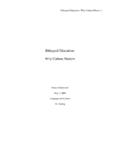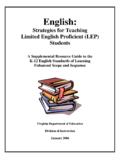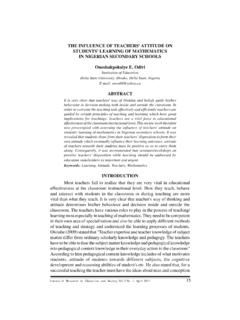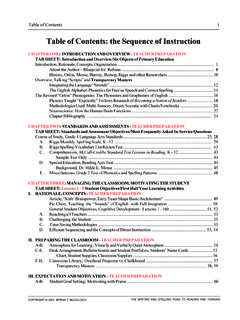Transcription of Teaching vocabulary learning strategies: awareness and ...
1 Teaching vocabulary learning strategies : awareness , BELIEFS, AND PRACTICES. A SURVEY OF. TAIWANESE EFL SENIOR HIGH SCHOOL TEACHERS. Supervisor: Dr. Adela G nem Lai,Yu-Ling MA in English Language Teaching Department of Language & Linguistics University of Essex September, 2005. CONTENTS. Acknowledgements .. iii Abstract .. iv CHPATER 1 CHAPTER 2 LITERATURE REVIEW ..6. vocabulary in SLA ..6. vocabulary and its Importance ..6. Knowing a vocabulary Item ..6. Current Trends in L2 vocabulary Language learning strategies (LLS) ..10. Definitions and Features of LLS 11. The Main Studies in LLS Field ..12. vocabulary learning strategies (VLS)..15. Key Previous Studies on VLS ..15. The Classification System for VLS ..17. Discovery strategies ..19. Guessing through Context ..19. Dictionary Word Part Analysis ..21. Consolidation strategies ..22. Memorization Cognitive Metacognitive strategies ..24. Teachers' Beliefs and Practices ..24. The Nature of Teachers' Beliefs ..24.
2 Research on Teachers' Beliefs and Teaching Practices ..27. Correspondence between Beliefs and Practices ..27. Discrepancy between Beliefs and Practices ..28. CHAPTER 3 Objectives ..30. General Background ..30. Personal Questionnaire as a Tool for Data Rationale for Questionnaire Design ..34. Procedures ..39. Analysis of the CHAPTER 4 RESULTS & Self-Reported VLS & vocabulary Teaching Practices ..42. Quantitative Survey Findings on Teachers' Beliefs and Practices ..46. CHAPTER 5 DISCUSSIONS ..53. Teachers' awareness of VLS Based on Personal learning Experience ..53. Popular VLS among the Teachers ..56. Correlations between Teachers' Beliefs and Practices on CHAPTER 6 CONCLUSION ..61. References ..64. Appendices ..72. 1. An example of a typical unit in the senior high school English textbook 2. Questionnaire on Teaching vocabulary learning strategies 3. T-test results Acknowledgements I would like to express my appreciation, first and foremost, to my supervisor Dr.
3 Adela G nem, who guided me to develop my study into a practicable frame in the very beginning and offered valuable suggestions while the work was in progress. My thanks also go to all the teachers that have instructed me at the University of Essex for their inspirational lectures in class, by which I have been motivated to explore some interesting issues concerning English language Teaching and learning . I am extremely obliged to a great number of friends both in Taiwan and in the , without whose genuine encouragement my MA study here is hard to accomplish. I owe a debt of thanks to a friend, Yuan-Huang Chen, who has been a good companion over the past few months when I worked on my dissertation. Last but not least, I would like to give my immense gratitude to my family and boyfriend in Taiwan, without whose support my dream of pursuing further study abroad would not have been possible. Abstract The present study investigated the awareness , beliefs, and instructional practices with respect to vocabulary learning strategies of Taiwanese EFL teachers in senior high school contexts.
4 Over the past two decades, vocabulary learning strategies have appeared to be of much concern in that the pressing need of building up a repertoire of lexical words at hand is readily seen by L2 learners and vocabulary acquisition has revived to play a central role in the language classroom. However, the fact that the majority of L2 learners have traditionally been taught by methods paying insufficient attention to vocabulary might lead on to an unfavourable scenario whereby vocabulary acquisition continues to be neglected, since language teachers themselves have been mostly instructed toward grammar-oriented language learning . Studies on teachers'. beliefs and practices have suggested that the 13,000-hour apprenticeship of observation in the classroom plays a significant role in teachers' underlying assumptions and beliefs in language learning , which then exerts considerable influence on their Teaching practices. Thus, the present study attempted to elicit information about teachers' awareness and beliefs based on individual learning experience, and further examine the correlations between teachers' beliefs and their Teaching practices.
5 A questionnaire was implemented to collect data on the issues involved. The results have suggested that the English teachers studied were aware of a range of vocabulary learning strategies , including both direct and indirect approaches to vocabulary acquisition. Nevertheless, some Teaching practices seemed not to conform to research-informed orientation, implying the gap between the reality in the language classroom and implications from empirical research. Overall speaking, there existed positive correlations between the teachers' beliefs and their instructional practices. Some minor discrepancies involved might be attributable to various contextual factors. Thus, a need is seen to incorporate awareness -raising activities in pre-service or in-service teacher education programs to inform language practitioners of the state-of-the-art vocabulary pedagogy based on empirical research, as well as some practicable approaches to dealing with contextual dilemmas. CHPATER 1 INTRODUCTION.
6 The trends of linguistic theory play a role in the development of language pedagogy. The earlier dominance of Chomskyan school of linguistics partly accounts for the general neglect of vocabulary acquisition in favor of syntactic development. This argument is supported by S kmen (1997, ) noting that most L2 practitioners today have been trained in teacher education programs or molded by textbook writers to understand the terminology and teach the systemacity of grammar . However, the fact that foreign language learners generally see vocabulary learning as their first priority and report that they encounter considerable difficulty in vocabulary learning is extensively recognized by language teachers and repeatedly pointed out in various learning contexts. Although vocabulary Teaching and learning has suffered neglect for a long time, owing to the advances in the linguistic study of the lexicon, psycholinguistic investigations into the mental lexicon, and the popularity of the communicative approach since the 1970s, we have seen a re-think of the role of vocabulary in language pedagogy.
7 Over the past two decades, a substantial range of research concerning vocabulary acquisition has provided us with valuable insights and suggestions to vocabulary instruction in the language classroom. Early research findings of L1 vocabulary acquisition by Nagy and Herman (1985) lead our perspective to a more implicit and incidental approach of vocabulary acquisition through extensive reading since children are observed to expand their vocabulary knowledge progressively through repeated exposures in various discourse contexts (Coady 1997b). Following this same logic, proponents ( Krashen 1989) of this view argue that it is impractical to learn an enormous amount of vocabulary in a structured and explicit way due to the time constraints of the L2 classroom. Nevertheless, the urgent need to reach a threshold level of vocabulary is readily seen by L2 learners under the condition that they do not immerse in a rich-input learning context as their L1 counterparts.
8 Concurrently, the ineffectiveness of simply giving implicit vocabulary instruction is pointed out by more and more research and thus an improved approach integrating indirect Teaching of vocabulary through a variety of meaning-focused activities with a more bottom-up and direct Teaching of vocabulary with explicit instruction is advocated (S kmen 1997). A. review of the development of language Teaching pedagogy leads us to draw a conclusion that the pendulum has swung from direct Teaching of vocabulary (the grammar translation method) to incidental (the communicative approach) and now, laudably, back to the middle: implicit and explicit learning (S kmen 1997, ). In the late 70s and early 80s, the development in the area of second language acquisition research turns attention away from a Teaching -centred perspective to one which included interest in how the actions of learners might affect their acquisition of language (Schmitt 1997, ). In other words, the belief that individual learners'.
9 Endeavours tend to be a governing factor in the language learning process was gradually formed among a number of scholars (Schmitt 1997). Language teachers, therefore, were getting motivated to examine what the individual learner, especially successful learners, do in their study to elicit useful information on the process of language acquisition. Rubin (1975) and Stern (1975) are two of the earliest researchers who shift their focus from Teaching methods and materials to a more learner-centred aspect, maintaining that successful language learners employ a variety of learning strategies in their study to facilitate language acquisition. Other surveys ( Bialystok & Fr hlich 1977; Naiman et al. 1978) also reveal findings supporting Rubin's argument (Reiss 1985). By means of questionnaires, interviews, and observation, a more substantial collection of learning strategies is made possible and researchers attempt to construct a rigorous framework to describe them adequately.
10 O'Malley and Chamot (1990, ). define learning strategies as special thoughts or behaviors that individuals use to help them comprehend, learn, or retain new information and classify these strategies into three major types: metacognitive strategies , cognitive strategies , and social/affective strategies . Building on the research by Chamot, O'Malley, Danserearu, and Rubin, Oxford (1990) has compiled a most comprehensive classification of language learning strategies including six major categories. The direct strategies consist of memory strategies , cognitive strategies , and compensation strategies ; the indirect category contains metacognitive strategies , affective strategies , and social strategies . One point to note about the learning strategies is that they are not the preserve of highly capable individuals, but could be learned by others who had not discovered them on their own . (O'Malley & Chamot 1990, ). The argument that learning strategies are teachable also helps to break the myth that some learners have an aptitude for languages and thus achieve high language proficiency without too many efforts.







